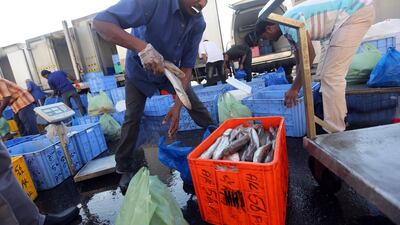Abu Dhabi fisherman have told Dr Thani Al Zeyoudi, Minister of Climate Change and Environment, that they want year-round fishing rights with no restrictions.
Fishermen are banned from using encircling nets, which catch certain species of migratory fish, between May 1 and October 14 to protect a high-value migratory species known as kanaad or Scomberomorus commerson during its spawning season – April to August.
Fishermen said the fish, a migratory species, would be caught in other countries if they were not taken in UAE waters.
“This is not a sustainable approach and there needs to be regional collaboration on the protection of migratory species by range states, which in fact is in place for the kanaad by the GCC countries,” said Ayesha Al Blooshi, Environment Agency Abu Dhabi’s director for marine biodiversity.
“This, of course, is in the interest of the fishermen and to protect the sustainability of their profession, plus during the ban season other fishing methods are still available.
K M, an Emirati fisherman, said: “We know how to fish, this is our livelihood of course we care but if we don’t fish them here they will be fished in other countries.”
There have been requests from fishermen to permit the use of other types of fishing nets during the six-month ban period.
But the requests have been denied as the period from April to August is the main spawning season for several commercially important species, such as the hammour, and several protected species, such as the safi, shaari and badh.
Therefore, fishermen are, at times, without their first pick of fishing spots.
“I have to allow my fishers to go home,” said K M, whose crews are mostly from South Asian countries.
“If they go home and come back during the off season, I can’t make a living that way.”
During the meeting the fishermen also said they would like to relax the limits on fishing.
This is something Oliver Kerr, senior marine conservation officer, would advise caution on.
“Overfishing is taking its toll on our seas,” he said.
“By removing fish at a faster rate than they can reproduce, it reduces fish stocks across the world, which in turn affects the whole interconnected marine ecosystem.
“If sustainable measures are put in place to protect fish stocks from overfishing, such as using marine protected areas, not only will it keep our seas healthy and teeming with life but also has the benefit of sustained food security for human populations across the globe.”
Dr Al Zeyoudi said the ministry would study all issues faced by the fishermen and work to address them.
Other laws stipulate that during the off-season, from February to July, the country bans the sale of any of the 29 indigenous or migratory shark species.
The UAE also limits or bans fishing in areas designated breeding grounds or ecosystems conducive for animal reproduction.
In 2004, the Ministry of Climate Change and Environment placed restriction on the specifications of traps known as gargoor, which are used to catch species close to the sea floor, because they were killing endangered species and destroying coral reefs.
“People need to be aware of the state of our oceans and the laws that protect them,” Mr Kerr said.
nalwasmi@thenational.ae

